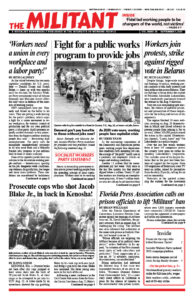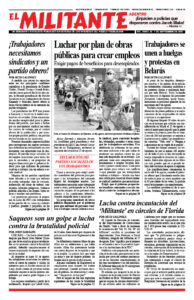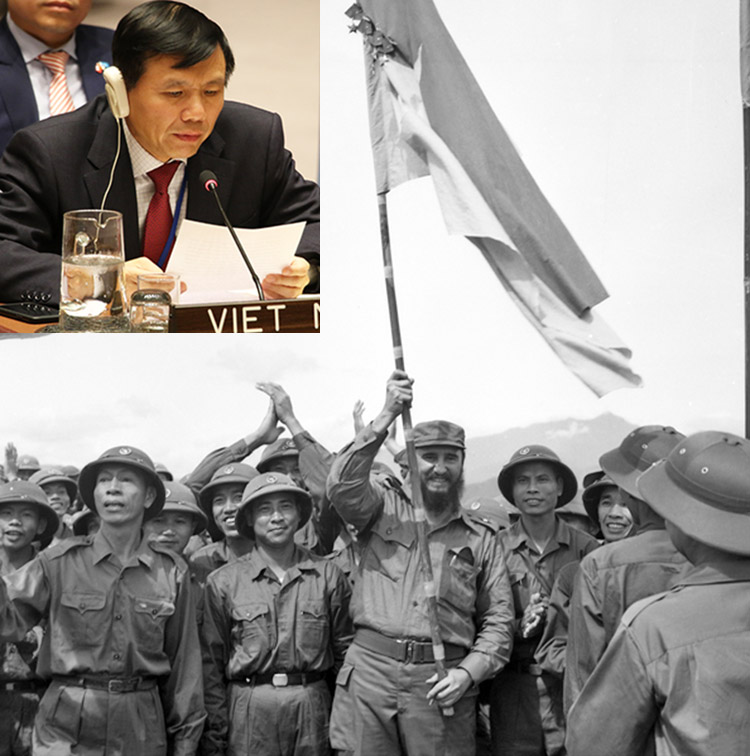The political legacy of Cuban revolutionary leader Fidel Castro was celebrated in an online program Aug. 13 organized by supporters of the U.S. National Network on Cuba, Canadian Network on Cuba, and Table de Concertation de Solidarité Québec-Cuba. The co-chairs were Tamara Hansen of the Canadian Network and Ike Nahem, a leader of the Cuba Sí coalition in New York.
This year marks the 60th anniversary of the Cuban Institute for Friendship with the Peoples, said Fernando González, ICAP’s president, in a video from Havana. The organization was founded at Fidel’s initiative in 1960, he said, “when the U.S. embarked on a hostile policy of isolation against Cuba. A policy that, as you very well know, continues today.”
This year, said González, the U.S. government is blocking Cuba’s efforts to purchase medical supplies to treat COVID and escalating its campaign of lies against Cuba’s internationalist brigades of doctors and medical workers in some 40 countries.
Others making remarks as part of the program included Cuba’s ambassadors to the U.S., Canada and United Nations — José Ramón Cabañas, Josefina Vidal and Ana Silvia Rodriguez — as well as Adán Chávez, Venezuela’s ambassador to Cuba.
Ambassador Dang Dinh Quy of Vietnam’s U.N. mission said that Cuba had been a “pioneer” in its support of the Vietnamese people’s revolutionary struggle against U.S. imperialism’s brutal war to block the country’s national sovereignty and unification. “We will never forget Fidel’s declaration,” Dang said, that “For Vietnam, Cuba is willing to shed its blood.”
Dang displayed photographs of Fidel’s September 1973 trip to liberated areas in U.S.-occupied south Vietnam — the first and only head of state from anywhere in the world to visit there. The pictures showed Fidel meeting with Vietnamese working people, soldiers and leaders of the government and national liberation forces.

Clever Banganayi of the Friends of Cuba Society in South Africa paid tribute to the 425,000 Cuban internationalist combatants who volunteered in Angola between 1975 and 1991. Banganayi, who studied in Cuba in the 1990s, explained that the Cuban internationalists had come to “help safeguard the territorial integrity of Angola, to pave the way for the independence of Namibia and the defeat of apartheid” in South Africa itself.
Banganayi recalled the 1978 massacre of some 600 Namibians by the South African Defense Force at a refugee camp at Cassinga, in southern Angola. Only a few weeks later, he said, hundreds of surviving Namibian children arrived in Cuba for medical care and schooling. “Cuba opened its doors widely and generously to the Namibian refugees,” he said.
“Cuba has undertaken solidarity not as a means of foreign policy,” Banganayi added, “but as a moral and fraternal commitment to the people of Africa.”
Don Rojas, press secretary to Prime Minister Maurice Bishop during the 1979-1983 revolution in the Caribbean island of Grenada, also paid tribute to the “principled internationalist solidarity demonstrated by Fidel and the Cuban Revolution.” He recalled Castro’s statement in 1980 that the revolutions in Cuba, Nicaragua and Grenada were “three giants rising up to defend their independence, sovereignty and justice on the very doorstep of imperialism.”
Rojas said he would never forget the day in early 1980 when a Cuban freighter arrived in Grenada “with brand new construction equipment — from bulldozers, to cranes, to earthmoving trucks.” When Castro had asked Bishop in 1979 what Grenada needed most to advance its economic development, Bishop replied: an international airport. And there, only a few months later, was the equipment! Cuba also sent volunteer construction workers, engineers, architects, doctors, dentists and teachers, Rojas said.
Other speakers included Mary-Alice Waters, a leader of the U.S. Socialist Workers Party and president of Pathfinder Press (Waters’ remarks are reprinted here), and Vijay Prashad, executive director of Tricontinental: Institute for Social Research. Among the cultural readings and musical performances was a video of acclaimed Cuban poet Nancy Morejón reading her work, “For Fidel.”
Gail Walker, executive director of IFCO/Pastors for Peace, closed the presentations.


